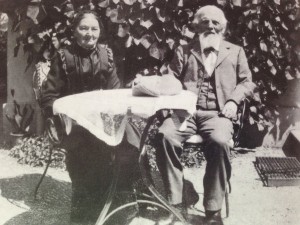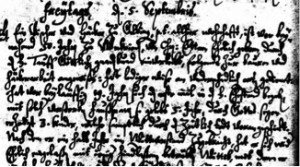When I was younger, I used to love reading books about someone from the past ending up in our modern world (to be honest, I still do – Er ist wieder da, or ‘Look Who’s Back’ in English, is an entertaining German book about this very occurrence). I would laugh at the amazement of these old-fashioned people as they spotted cars, planes, microwaves, etc. for the very first time, all the while secretly thinking of us, the people of the late 20th/early 21st century, as “better” than the outdated, technologically-ignorant people of the past. Nothing malicious by any means, just a subtle sense of superiority at being born in a world where it’s normal to fly to a different country at the drop of a hat, to find information instantly on the internet, and so on. I think we all can relate to thoughts such as “I can’t believe they didn’t know [fill in the blank here] back then.”
However, through translating historical letters and documents from as far back as 1645, you start to think of these people as actual people like you and me, and not just as outdated ancestors who would be amazed at being able to get a car ride at the click of a phone button (although they probably would be). One letter that really stuck out to me was a letter from 1923. In it, an older man is writing to his sister in America. He writes,
I am currently healthy, but occasionally weak. At times it’s better, at times worse. I do get out of bed most days, now and then I lay in bed for a few days. I’m mostly still well, but I’m already 80 years old. On February 4, if I live that long, I will be 81.
And then again in 1926:
Dear sister…I’ve often thought that things will come to an end, but then I get better again. Our lives last 70 years and if they are long, then 80 years. I am now 83, my last hour will also come and I will be released from my suffering.
Although there is nothing particularly shocking about these letters, I was touched by the utter normality of them. Here was a man who was 80 in 1923. That means he was born in 1843 – almost 200 years ago. But if you took these excerpts out of context, they could have been written by any 80 year-old today, almost 100 years later, contemplating mortality just as humans have done for centuries.
Going even further back, to letters from Germany to America in the 1860s, I was also impressed by how “normal” the people seem.
We just had many visitors from the city. Everyone says to tell you hello. I didn’t recognize Mrs. S and I wouldn’t have recognized Mrs. N if I didn’t know her face, she’s changed so much, but not to her advantage. She invited us to visit her next year and to stay with her because they live alone in that big house; she also brought us a ring cake.
Again, this letter was written over 150 years ago. But the sentiments could have been written by you or me (although perhaps we would be a little nicer and not talk about people’s looks changing for the worse!)
And then finally, going all the way back to 1645 – although I haven’t translated any letters from the time period, I worked with a certificate discussing a man named Michael:
Michael F., a fisher and farmer…, temporary resident here, was born [about] 50 years ago in Weckrieden as the legitimate child of [Christian] parents, accepted by God through baptism, later employed as a farmer…Approximately 19 years ago, he got married…Through God’s grace, three children followed…
This certificate is almost 400 years old. 400! And though the wording of such documents may have changed slightly, the facts remain the same. A man lived, worked, got married and had children. Just as we do today.
So what am I trying to say? It’s a hard feeling to describe, and I’m not exactly sure myself. I think it’s more the realization that our lives are just a brief blip in the expansive history of time. In the above documents, one man got to experience the world in the late 19th-early 20th century, another lady in the mid-19th century, and Michael all the way back in the 1600s. But now, at the beginning of the 21st century, it’s our time. Our time, which was once the future, and will soon become the past. So let’s make the most of it.
Image Credit:





6 Responses
Yes, it’s getting the sense of a person which I find the most interesting aspect of family history, and the context – what’s going on around them at the time historically and the social setting.
Your post resonated with me for two things in particular. One, that my dad died recently, aged 87, and your letters reflected a similar sentiment to his struggles over the past couple of years regarding his decreasing mobility.
The second, was the ‘blip’ in time. I found amongst his things some letters he and my late mum had written to one another before they were married, full of hope and excitement for the future. While it was touching to read, it was also quite sad and I’ve grappled with trying to put into words as to why that was. I guess it’s to do with that concept of it being a ‘blip’, that in the bigger scheme of things, so brief and now it’s over. So as you say, let us make the most of our own blips!
Wendy, I’m sorry to hear about your father. What special letters to have, but I know what you mean. Thanks for sharing your insight.
My bubble of ignorance was burst in college. I’d previously thought of people before 1860 as being largely ignorant and superstitious. Then I came across the writings of Thomas Paine and Thomas Jefferson, and (allowing for some relatively minor differences in grammar and spelling) I was impressed by the utter clarity of logical and ethical considerations. Voltaire’s ideas were so vivid that I felt as if he was a personal friend. What really “did it” for me, was a piece written by an Anglican priest, musing about the possibility of life on other planets; his ideas could stand up well with those of our “modern” astronomers.
Thanks for sharing George. I can understand how those writings could change your views.
I was reading a book by a non-communist historian, where she quoted from the writings of Karl Marx, and I was really surprised how his observations still resonated with the political situation in today’s Europe, Of course she must have selected the most suitable, bur still!
But what I find most surprising in reading mid19th century work is how quickly news travelled without the benefit of radio, TV or telephones and with motorised transport in its infancy..
Thanks for the thoughts Eva. It’s amazing how often history repeats itself or is at least relevant to modern times.